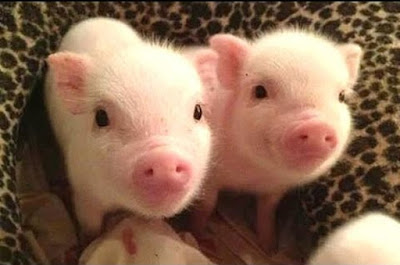 |
| A new disciple of the Buddha offers a meal to the Teacher (Buddhism/jendhamuni.com) |
.
“Pig’s Delight”?
 |
| Out of the mouths of Babe(s) |
These are patently specious claims. A Pali canon (Theravada Buddhist) discourse called the Jivaka Sutta is the source of the infamous “three purities” argument. It states:
“I proclaim that there are three circumstances when meat should not be eaten:
- when it is seen,
- heard, or
- suspected [as being present?]
“I proclaim that meat should not be eaten under those three circumstances.”
- Jīvaka questions the Buddha about meat eating, and he says: “Anyone who slays an animal for the use of a monastic and gives it to that monastic commits a terrible evil.” Jīvaka is pleased with this answer and declares himself a follower of the Buddha (M.i.368f.)
- Note, if a monastic were to eat meat, he or she would not necessarily be guilty of killing or even encouraging anyone to kill IF he or she neither saw, heard, nor suspected that an animal was killed [for one's sake or for any misguided reason]. Of course, we don't blame recipients of someone else's giving/dana). For example, if we give to a homeless person, is that good or bad? Does it depend on what that person chooses to do with the money if we did not know when we offered it? If he buys a knife and stabs someone, are we guilty of murder? We acted, and he acted.
- Further questioned by Jīvaka, the Buddha explains that a follower (upāsaka) is one who has "gone for guidance" to the Three Gem (Buddha, Dhamma, and [Noble] Sangha, what the Buddhist Teacher Seven translates as "the Teacher, Teaching, and [successfully] Taught") and undertaken the Five Precepts or lay training rules, and that such a person, by reason of these qualities, works for the benefit of oneself and others (A.iv.222f.)
- One's virtue (sila) is "pure" if one follows the Five Precepts, which means abstaining from doing harm by killing or causing to kill, stealing or causing to steal, engaging in sexual misconduct or causing another to do so, engaging in false speech [which is the biggest one because this actually has four factors*] or causing another to do so, consuming intoxicants that occasion heedlessness (negligence, moral carelessness) or causing another to do so.
- *"False speech" means bearing false witness or speaking divisive, idle, or harsh speech, all of which gets translated as "lying" when it is so much more.
- Finally, a Buddhist or disciple avoids "wrong livelihood": business in arms, business in living beings (animals, people, insects), business in meat, business in alcohol, or business in poisons (A.V.177).
- In this way one avoids the Ten Courses of Unwholesome Action or "bad karma."
Clearly, the Buddha is stipulating that if a monastic disciple (bhikkhu, bhikkhuni, samanera, samaneri, or maechi and sometimes anagārikas -- monk, nun, male novice, female novice, white clad ten precept nuns or special probationers) inadvertently consumes meat that has been placed in one's alms bowl, one is not at fault.
Guidelines are more lax in all things for lay Buddhists, who simply maintain the Five Precepts; however, those precepts include "not killing nor causing anyone else to kill." What is one doing when paying a butcher shop or supermarket for slaughtered flesh but hiring someone to slaughter, cut up, and sell the dead or their organs? That would be causing (asking, inducing, enticing, ordering, paying) someone else to kill for us. How can we be so deluded as to think that we did not order, cause, or contribute to that killing? The Godfather doesn't get his hands dirty but pays Guido to do his killing for him. Guido doesn't know the victims and is just doing the job he was paid to do. Is the Godfather guilty of murder for the people Guido's hands kill?
All mothers are alike in raising kids
 |
| You're not going to slaughter me? - No! I'm going to pay my butcher to. - WHAT!?! - He's the killer. |
One's action (intention, karma, deed) remains pure. However, if one sees, hears, or so much as suspects that there is meat in one's bowl, one must not eat it.
Later commentators gratuitously inserted the phrase [“that the living being has been slaughtered for oneself”] after each iteration of the word “suspected.”
That phrase does NOT appear in the original Pali text. It is a spurious addition, making it seem as if the Buddha allowed monastic disciples under his training to eat meat so long as an animal was not expressly killed to feed them, or at least when they did not see, hear, or suspect that such a killing (slaughtering, butchering) took place.
 |
| I live by Mafia rules, keep my hands clean |
The Buddha gives extensive arguments against meat (flesh, animal) eating in the Angulimaliya Sutra, Nirvana Sutra, Karma Sutra, Shurangama Sutra, Mahamegha Sutra, Lankavatara Sutra, Maha Parinirvana Sutra, and others.
In the “Net of All-Embracing Views Discourse” (Brahmajala Sutta), Shakyamuni (the historical Buddha Gautama) exhorts his disciples to adopt veganism:
“Monastics, should you willingly and knowingly eat flesh, you defile yourselves. Pray, let us not consume any flesh or whatsoever comes from sentient beings.”
Perhaps the most infamous of all revisionist interpretations is the one claiming that the Buddha passed away from eating contaminated pork (trichinosis, dysentery, cholera) offered by Cunda the Silversmith.
The term used in the Pali language “Great Final-Nirvana Discourse” (Mahaparinibbana Sutta) to describe the dish that Cunda served the Buddha at his last meal is sukara-maddava, which literally means “pig’s delight” — a clear reference to truffles, a type of mushroom (underground fungal fruiting body) that pigs delight in sniffing out, digging up, and eating as much of as possible.
The Pali term for “fatty pig meat, slaughtered swine flesh, or sliced stomach” is sukara-mamsa.
- COMMENTS
- (I. Rony) I think "pig's delight" means bloody pig, lard bacon, or hog's hair and eyes [aka hotdog or salami] because, think about it, when you order "Buddha's Delight" at a Chinese restaurant, it's Buddha flesh from that Fat Happy Guy at the door, isn't it? It has to be because it's right in the name.
- (Capt. Obvious) Hey, General Tso's Chicken contains canned General Tso...cannibals who like MSG order it all the time...so Pig's Delight is probbly 'Delightful Pig' in blood sauce with soy with entrails or offal guts
- “Boar, hog [pig, peccary, swine, suina, suines]” = Sukara, Śūkara, Sūkara, Su-kara, Shukara: 30 definitions (wisdomlib.org)
The famous Buddhist scholar Carolyn Rhys-Davies Caroline A.F. Rhys Davids -- wife and colleague of T.W. Rhys-Davids, founder of England's Pali Text Society), who served as its president from 1923 to 1942 -- clearly noted the discrepancy more than seven decades ago.
 |
| Hollywood's Babe, a talking farm pig (film) |
But proponents of human carnivory still trot out this fallacy today. Unless one is ignorant of the Pali language, or is willfully misleading oneself or others, it is impossible to assert that “pigs delight” means “delicious pork,” as if the Buddha had ordered a greasy dish in some Chinese restaurant.
In the Dhammapada, the Buddha says:
“All beings tremble before danger; all fear death.
When we consider this, we do not kill nor cause to kill.
All beings tremble before danger; life is dear to all.
When we consider this, we do not kill nor cause to kill.”
All beings means all beings, not just humans and devas.
- Meal of delicious truffles: dhammikaweb.com
- Buddhist veganism/vegetarianism
- The linchpin to restraint is shame (trepidation, scruples) and dread (considering the karmic consequences)
- Did Buddha [eat] pork before dying? | Vipin Tyagi
- Based on outline by Tashi Nyima, Great Middle Way, Jan. 10, 2013; edited, clarified, and expanded by Dhr. Seven, Amber Larson, Ananda (Dharma Buddhist Meditation), CC Liu, Wisdom Quarterly 2024























































































































































































































































No comments:
Post a Comment